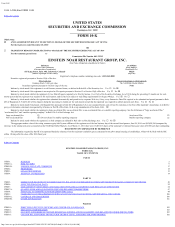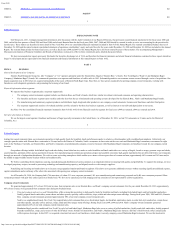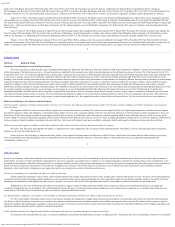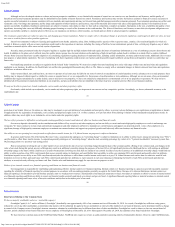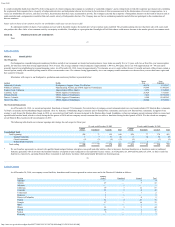Einstein Bros 2010 Annual Report Download - page 8
Download and view the complete annual report
Please find page 8 of the 2010 Einstein Bros annual report below. You can navigate through the pages in the report by either clicking on the pages listed below, or by using the keyword search tool below to find specific information within the annual report.
Form 10-K
http://www.sec.gov/Archives/edgar/data/949373/000119312511067286/d10k.htm[9/11/2014 10:09:09 AM]
Table of Contents
Although we have developed criteria to evaluate and screen prospective candidates, we are limited in the amount of control we can exercise over our franchisees and licensees, and the quality of
franchised and licensed restaurant operations may be diminished by any number of factors beyond our control. Franchisees and licensees may not have the business acumen or financial resources necessary to
operate successful restaurants in a manner consistent with our standards and requirements and may not hire and train qualified managers and other restaurant personnel. Poor restaurant operations may affect each
restaurant’ s sales. Our image and reputation, and the image and reputation of other franchisees and licensees, may suffer materially and system-wide sales could significantly decline if our franchisees do not
operate successfully. In addition, franchisees and licensees are subject to business risks similar to those we face such as competition, consumer acceptance, fluctuations in the cost, availability and quality of raw
ingredients, increasing labor costs and difficultly obtaining proper financing as a result of the downturn in the credit markets. The failure of franchisees and licensees to meet their development obligations or to
operate successfully could have a material adverse effect on us, our reputation, our ability to collect royalties, our brands and our ability to attract prospective candidates.
Our restaurants and products are subject to numerous and changing government regulations. Failure to comply with or substantial changes in government regulations could negatively affect our sales, increase
our costs or result in fines or other penalties against us.
Each of our restaurants is subject to licensing and regulation by the health, sanitation, safety, labor, building and fire agencies of the respective states, counties, cities and municipalities in which it is
located. A failure to comply with one or more regulations could result in the imposition of sanctions, including the closing of facilities for an indeterminate period of time, or third party litigation, any of which
could have a material adverse effect on us and our results of operations.
Recently, many government bodies have begun to legislate or regulate high-fat and high sodium foods and require disclosure of nutritional information as a way of combating concerns about obesity and
health. In addition to the phase-out of artificial trans-fats, public interest groups have focused attention on the marketing of high-fat and high-sodium foods to children in a stated effort to combat childhood
obesity. Some cities and states have recently adopted or are considering regulations requiring disclosure of nutritional facts, including calorie information, on menus and/or menu boards. Additional cities or states
may propose or adopt similar regulations. The cost of complying with these regulations could increase our expenses and the possible negative publicity arising from such legislative initiatives could reduce our
future sales.
Our franchising operations are subject to regulation by the Federal Trade Commission. We must also comply with state franchising laws and a wide range of other state and local rules and regulations
applicable to our business. In addition, the Dodd-Frank Act and the rules promulgated thereunder may affect us. The failure to comply with or substantial changes in federal, state and local rules and regulations
would have an adverse effect on us.
Under various federal, state and local laws, an owner or operator of real estate may be liable for the costs of removal or remediation of certain hazardous or toxic substances on or in such property. Such
liability may be imposed without regard to whether the owner or operator knew of, or was responsible for, the presence of such hazardous or toxic substances. Although we are not aware of any environmental
conditions that require remediation by us under federal, state or local law at our properties, we have not conducted a comprehensive environmental review of our properties or operations. We may not have
identified all of the potential environmental liabilities at our properties, and any such liabilities that are identified in the future may have a material adverse effect on our financial condition.
We may not be able to protect our brands, trademarks, service marks and other proprietary rights.
Our brands, which include our trademarks, service marks and other proprietary rights, are important to our success and our competitive position. Accordingly, we devote substantial resources to the
establishment and
15
Table of Contents
protection of our brands. However, the actions we take may be inadequate to prevent imitation of our products and concepts by others, to prevent various challenges to our registrations or applications or denials
of applications for the registration of trademarks, service marks and proprietary rights in the U.S. or other countries, or to prevent others from claiming violations of their trademarks and proprietary marks. In
addition, others may assert rights in our trademarks, service marks and other proprietary rights.
The loss of key personnel or difficulties recruiting and retaining qualified personnel could adversely affect our business and financial results.
Our success depends substantially on the contributions and abilities of key executives and other employees, and on our ability to recruit and retain high quality employees to work in and manage our
restaurants. We must continue to recruit, retain and motivate management and other employees sufficient to maintain our current business and support our projected growth. A loss of key employees or a
significant shortage of high quality restaurant employees to maintain our current business and support our projected growth could adversely affect our business and financial results.
Our ability to use net operating loss carryforwards to offset future taxable income for U.S. federal income tax purposes is subject to limitation.
In general, under Section 382 of the Internal Revenue Code, a corporation that undergoes an “ownership change” is subject to limitations on its ability to utilize its pre-change net operating loss (“NOL”)
carryforwards to offset future taxable income. A corporation generally undergoes an “ownership change” when the stock ownership percentage (by value) of its “5 percent stockholders” increases by more than
50 percentage points over any three-year testing period.
Due to transactions involving the sale or other transfer of our stock from the date of our last ownership change through the date of the secondary public offering of our common stock, and changes in the
value of our stock during that period, any new offerings may result in an additional ownership change for purposes of Section 382 or will significantly increase the likelihood that we will undergo an additional
ownership change in the future (which could occur as a result of transactions involving our stock that are outside of our control). In either event, the occurrence of an additional ownership change would limit our
ability to utilize a portion of our NOL carryforwards that are not currently subject to limitation, and could further limit our ability to utilize our remaining NOL carryforwards and possibly other tax attributes.
Limitations imposed on our ability to use NOL carryforwards and other tax attributes to offset future taxable income could cause us to pay U.S. federal income taxes earlier than we otherwise would if such
limitations were not in effect, and could cause such NOL carryforwards and other tax attributes to expire unused, in each case reducing or eliminating the benefit of such NOL carryforwards and other tax
attributes to us and adversely affecting our future cash flow. Similar rules and limitations may apply for state income tax purposes as well.
Failure of our internal controls over financial reporting could harm our business and financial results.
Our management is responsible for establishing and maintaining effective internal control over financial reporting. Internal control over financial reporting is a process to provide reasonable assurance
regarding the reliability of financial reporting for external purposes in accordance with accounting principles generally accepted in the United States. Because of its inherent limitations, internal control over
financial reporting is not intended to provide absolute assurance that we would prevent or detect a misstatement of our financial statements or fraud. Any failure to maintain an effective system of internal control
over financial reporting could limit our ability to report our financial results accurately and timely or to detect and prevent fraud. A significant financial reporting failure or material weakness in internal control
over financial reporting could cause a loss of investor confidence and decline in the market price of our stock.
16
Table of Contents
Risk Factors Relating to Our Common Stock
We have a majority stockholder and are a “controlled company”.
Greenlight Capital, L.L.C. and its affiliates (“Greenlight”) beneficially own approximately 64% of our common stock as of December 28, 2010. As a result, Greenlight has sufficient voting power,
without the vote of any other stockholders, to determine what matters will be submitted for approval by our stockholders to elect all of the members of our board of directors, and to determine whether a change
in control of the Company occurs. Greenlight’ s interests on matters submitted to stockholders may be different from those of other stockholders. Greenlight has voted its shares to elect our current board of
directors, and the chairman of our board of directors was an employee of Greenlight as of December 28, 2010. Subsequent to December 28, 2010, the chairman of our board retired from Greenlight.
We have listed our common stock on the NASDAQ Global Market. NASDAQ rules require us to have an audit committee consisting entirely of independent directors. However, under NASDAQ rules,

